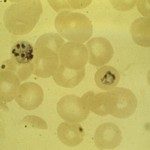Lien vers Pubmed [PMID] – 37474966
Lien DOI – 10.1186/s12936-023-04645-9
Malar J 2023 Jul; 22(1): 213
Artemisinin-based combinations therapy (ACT) is the current frontline curative therapy for uncomplicated malaria in Burkina Faso. Sulfadoxine-pyrimethamine (SP) is used for the preventive treatment of pregnant women (IPTp), while SP plus amodiaquine (SP-AQ) is recommended for children under five in seasonal malaria chemoprevention (SMC). This study aimed to assess the proportions of mutations in the P. falciparum multidrug-resistance 1 (Pfmdr1), P. falciparum chloroquine resistance transporter (Pfcrt), P. falciparum dihydrofolate reductase (pfdhfr), and P. falciparum dihydropteroate synthase (pfdhps), genes from isolates collected during household surveys in Burkina Faso.Dried blood spots from Plasmodium falciparum-positive cases at three sites (Orodara, Gaoua, and Banfora) collected during the peak of transmission were analysed for mutations in Pfcrt (codons 72-76, 93, 97, 145, 218, 343, 350 and 353), Pfmdr-1 (codons 86, 184, 1034, 1042 and 1246) dhfr (codons 51, 59, 108, 164) and dhps (at codons 431, 436, 437, 540, 581, 613) genes using deep sequencing of multiplexed Polymerase chaine reaction (PCR) amplicons.Of the 377 samples analysed, 346 (91.7%), 369 (97.9%), 368 (97.6%), and 374 (99.2%) were successfully sequenced for Pfcrt, Pfmdr-1, dhfr, and dhps, respectively. Most of the samples had a Pfcrt wild-type allele (89.3%). The 76T mutation was below 10%. The most frequent Pfmdr-1 mutation was detected at codon 184 (Y > F, 30.9%). The single mutant genotype (NFSND) predominated (66.7%), followed by the wild-type genotype (NYSND, 30.4%). The highest dhfr mutations were observed at codon 59R (69.8%), followed by codons 51I (66.6%) and 108 N (14.7%). The double mutant genotype (ACIRSI) predominated (52.4%). For mutation in the dhps gene, the highest frequency was observed at codon 437 K (89.3%), followed by codons 436 A (61.2%), and 613 S (14.4%). The double mutant genotype (IAKKAA) and the single mutant genotype (ISKKAA) were predominant (37.7% and 37.2%, respectively). The most frequent dhfr/dhps haplotypes were the triple mutant ACIRSI/IAKKAA (23%), the wild-type ACNCSI/ISKKAA (19%) and the double mutant ACIRSI/ISKKAA (14%). A septuple mutant ACIRNI/VAKKGA was observed in 2 isolates from Gaoua (0.5%).The efficacy of ACT partner drugs and drugs used in IPTp and SMC does not appear to be affected by the low proportion of highly resistant mutants observed in this study. Continued monitoring, including molecular surveillance, is critical for decision-making on effective treatment policy in Burkina Faso.

